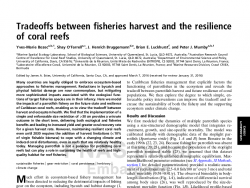
Yves-Marie Bozec, Shay O’Farrell, J. Henrich Bruggemann, Brian E. Luckhurst, and Peter J. Mumby
Many countries are legally obliged to embrace ecosystem-based approaches to fisheries management. Reductions in bycatch and physical habitat damage are now commonplace, but mitigating more sophisticated impacts associated with the ecological functions of target fisheries species are in their infancy. Here we model the impacts of a parrotfish fishery on the future state and resilience of Caribbean coral reefs, enabling us to view the tradeoff between harvest and ecosystem health. We find that the implementation of a simple and enforceable size restriction of >30 cm provides a win:win outcome in the short term, delivering both ecological and fisheries benefits and leading to increased yield and greater coral recovery rate for a given harvest rate. However, maintaining resilient coral reefs even until 2030 requires the addition of harvest limitations (<10% of virgin fishable biomass) to cope with a changing climate and induced coral disturbances, even in reefs that are relatively healthy today. Managing parrotfish is not a panacea for protecting coral reefs but can play a role in sustaining the health of reefs and high-quality habitat for reef fisheries.